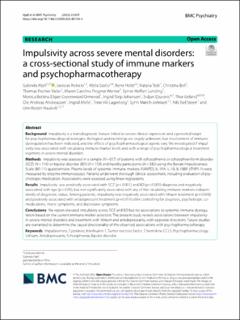Impulsivity across severe mental disorders: a cross-sectional study of immune markers and psychopharmacotherapy
Hjell, Gabriela; Rokicki, Jaroslav; Szabo, Attila; Holst, Rene; Tesli, Natalia; Bell, Christina; Fischer-Vieler, Thomas; Werner, Maren Caroline Frogner; Lunding, Synve Hoffart; Elkjær Greenwood Ormerod, Monica Bettina; Johansen, Ingrid Torp; Djurovic, Srdjan; Ueland, Thor; Andreassen, Ole; Melle, Ingrid; Lagerberg, Trine Vik; Mørch-Johnsen, Lynn Egeland; Steen, Nils Eiel; Haukvik, Unn Kristin Hansen
Journal article, Peer reviewed
Published version

Åpne
Permanent lenke
https://hdl.handle.net/11250/3117306Utgivelsesdato
2023Metadata
Vis full innførselSamlinger
- Department of Clinical Science [2318]
- Registrations from Cristin [9791]
Sammendrag
Background
Impulsivity is a transdiagnostic feature linked to severe clinical expression and a potential target for psychopharmacological strategies. Biological underpinnings are largely unknown, but involvement of immune dysregulation has been indicated, and the effects of psychopharmacological agents vary. We investigated if impulsivity was associated with circulating immune marker levels and with a range of psychopharmacological treatment regimens in severe mental disorders.
Methods
Impulsivity was assessed in a sample (N = 657) of patients with schizophrenia or schizophreniform disorder (SCZ) (N = 116) or bipolar disorder (BD) (N = 159) and healthy participants (N = 382) using the Barratt Impulsiveness Scale (BIS-11) questionnaire. Plasma levels of systemic immune markers (RANTES, IL-1RA, IL-18, IL-18BP, sTNFR-1) were measured by enzyme immunoassays. Patients underwent thorough clinical assessment, including evaluation of psychotropic medication. Associations were assessed using linear regressions.
Results
Impulsivity was positively associated with SCZ (p < 0.001) and BD (p < 0.001) diagnosis and negatively associated with age (p < 0.05), but not significantly associated with any of the circulating immune markers independently of diagnostic status. Among patients, impulsivity was negatively associated with lithium treatment (p = 0.003) and positively associated with antidepressant treatment (p = 0.011) after controlling for diagnosis, psychotropic co-medications, manic symptoms, and depressive symptoms.
Conclusions
We report elevated impulsivity across SCZ and BD but no associations to systemic immune dysregulation based on the current immune marker selection. The present study reveals associations between impulsivity in severe mental disorders and treatment with lithium and antidepressants, with opposite directions. Future studies are warranted to determine the causal directionality of the observed associations with psychopharmacotherapy.
